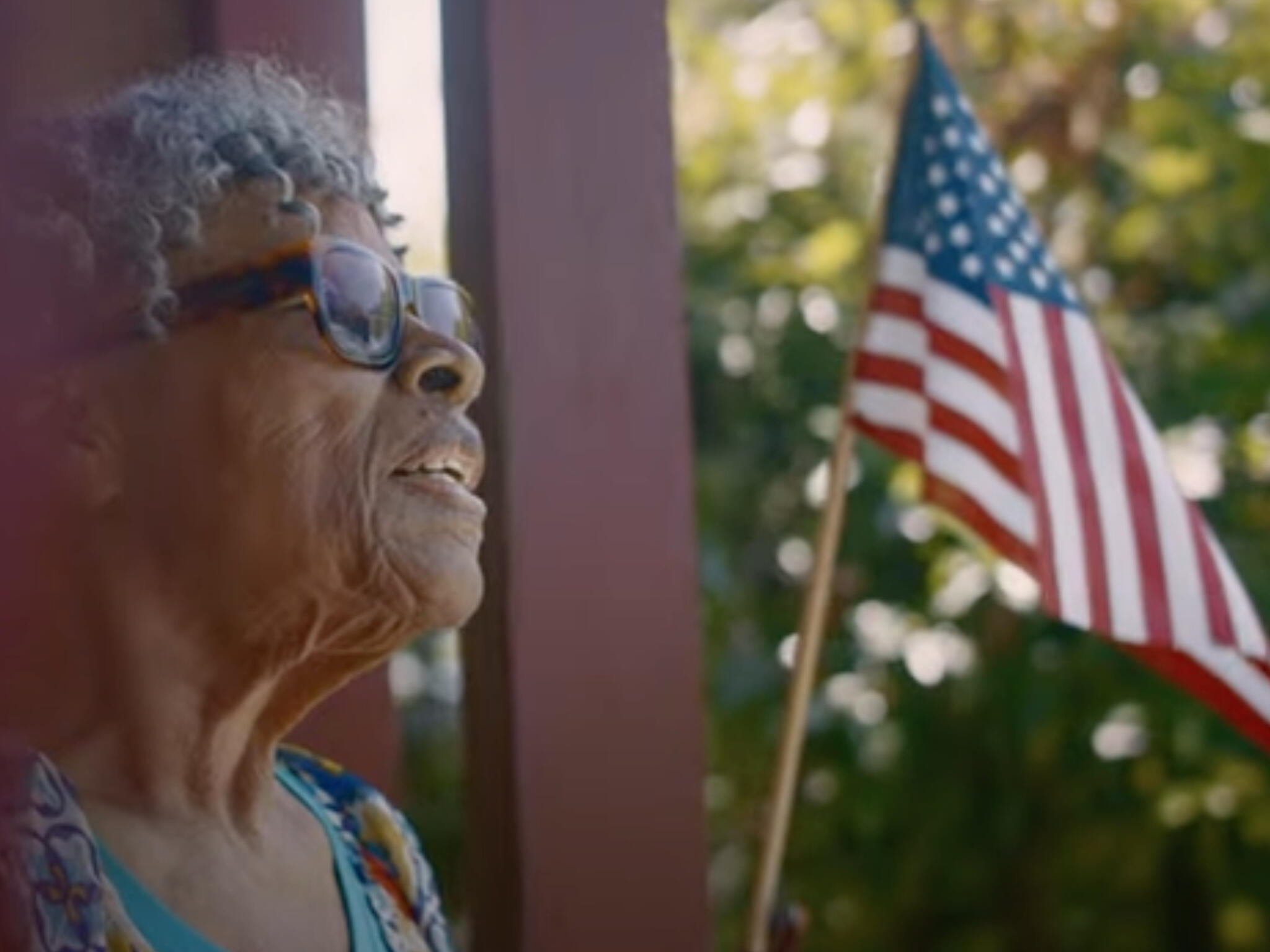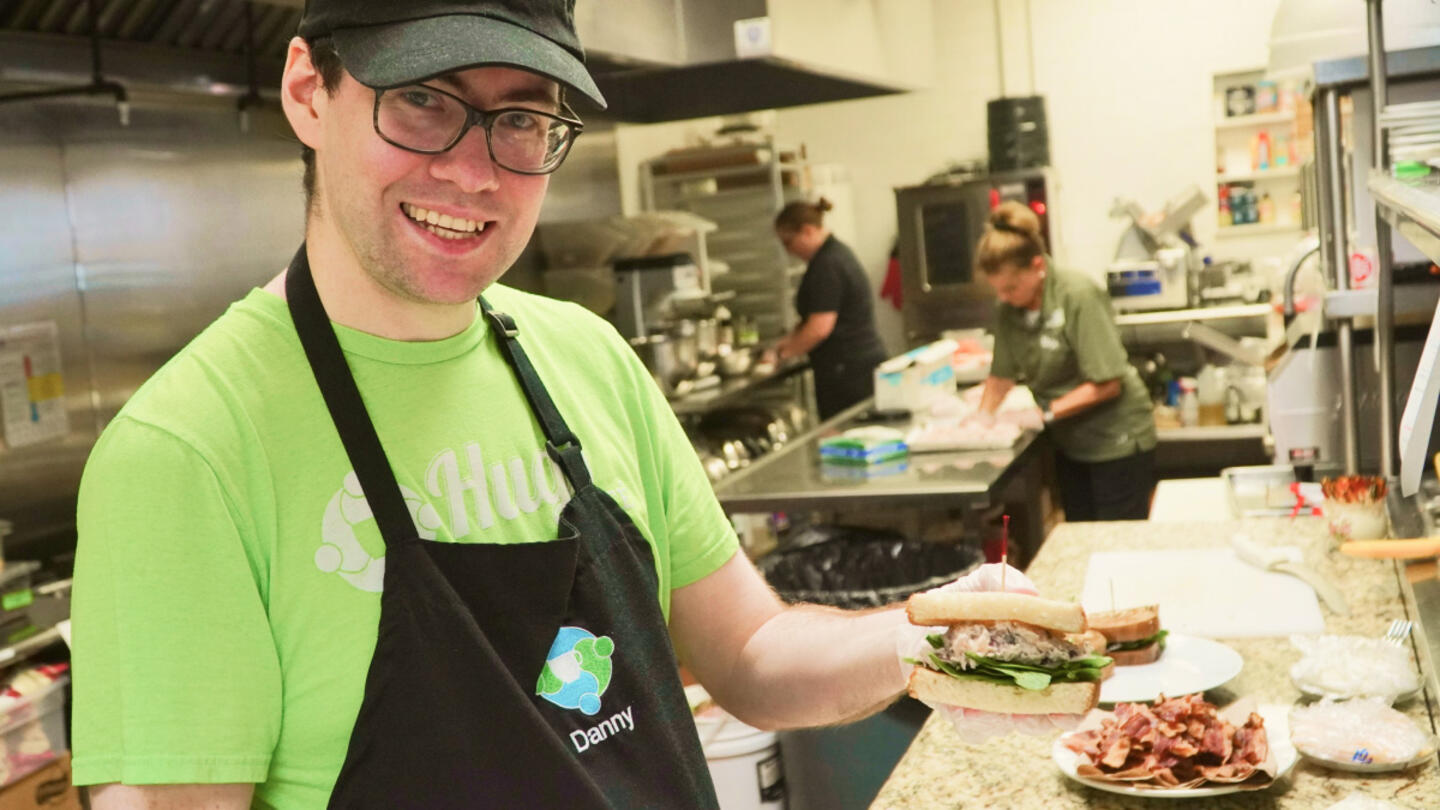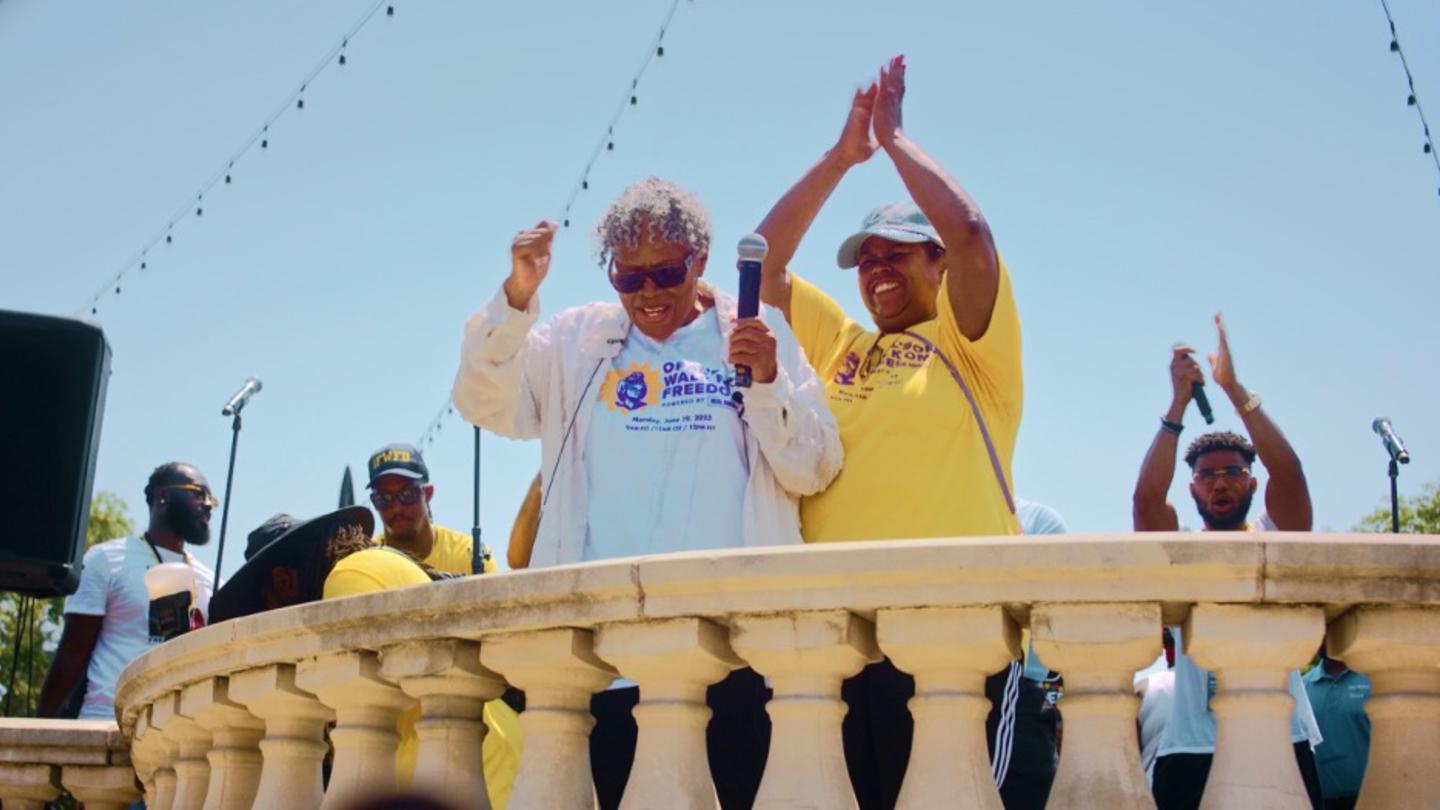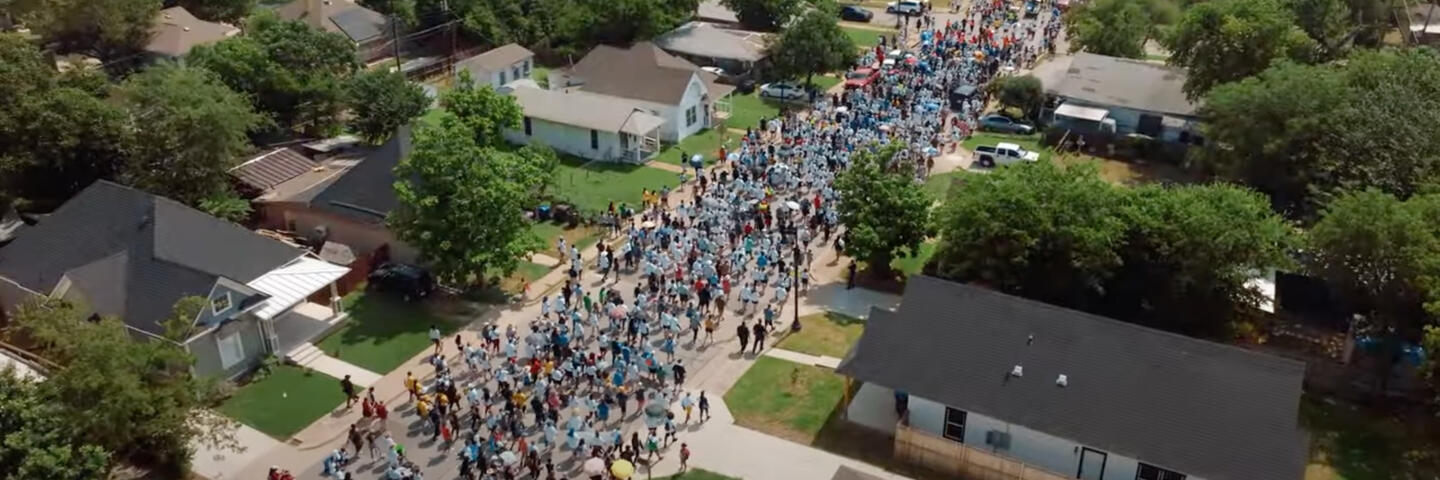Opal Lee’s family had only been living in their new home for four days when it was burned to the ground by a mob of white people in Fort Worth, Texas, in 1939.
It wasn’t until decades later that Lee realized the date: June 19.
“That was providential, even,” said Dione Sims, Lee’s granddaughter.
As an adult, Lee would work tirelessly to promote recognition of that date — colloquially known as “Juneteenth” — which marks the anniversary of the final enforcement of the Emancipation Proclamation and the legal end of slavery in 1865. In 2016, at 89 years old, she walked from Fort Worth to Washington, D.C., in a campaign to convince lawmakers to recognize Juneteenth as a national holiday. In 2021, her work was realized — and at 97, she continues to advance civil rights among local communities.
Now, in a full circle moment, Habitat for Humanity has rebuilt the home that was burned down in 1939 on the same spot it once stood. Lee will move in this month.
Lee, who received the Presidential Medal of Freedom for her activism last month, is known as the Grandmother of Juneteenth. Her legacy carries on in Sims, who is equally passionate about racial justice. As Lee prepares to live out the rest of her life comfortably in her new home, she hopes younger generations will follow her lead and take an active role in the change they want to see in their communities.
Sims has shouldered much of that responsibility, and now she’s helping others join the cause. Observing her grandmother’s efforts has taught her about how even making Juneteenth a holiday hasn’t healed all wounds — and how civil rights are about much more than race. Here she shares her thoughts on what’s next for her family and how leaders can ensure that everyone in their community is in a position to flourish.
“My grandmother has always been a humanitarian,” said Sims.
This was true long before Lee began publicly advocating for Juneteenth’s recognition as a federal holiday, back when she worked as an educator and counselor. According to Sims, Lee’s earlier career demonstrated the foundational principles of supporting human dignity and potential that would guide her later work.
“She was responsible for seeing why students weren’t being successful in school,” Sims said. “Her job was to visit the home to try and find out why the kid wasn’t in school. She saw that they didn’t have food. She saw that they didn’t have clothing. She saw that they didn’t have utilities. The conditions they were living in were so poor, so how could a kid be successful at all?”
Central to Lee’s impact is a long-held belief that solving larger problems starts with addressing the root causes that may be keeping an individual from reaching their fullest potential. Besides helping local students access better living conditions, she started a community computer literacy program to educate older citizens. She worked with a local food bank and started Opal’s Farm, an urban farming project in her community, to reduce food insecurity and provide work for formerly incarcerated people.
“It’s always around helping and bettering people,” said Sims. “It was the way she was brought up. My great-grandpa, her grandfather, was a living example of being your brother’s keeper. You help people. In that day and time, that’s how people survived — on the kindness of helping each other.”
Alongside her other community efforts, Lee has always advocated for national awareness of Juneteenth. In 2016, after walking from Fort Worth to Washington, D.C., she delivered a petition with more than 1.5 million signatures to Congress that resulted in Juneteenth being recognized as a federal holiday in 2021.
Lee continues to host and encourage 2.5-mile walks in communities every year to commemorate Juneteenth. She has been a central advocate for the newly founded National Juneteenth Museum expected to open in 2026.
After so many years of dedication to her community, it’s only fitting that the community is giving back by rebuilding her long-lost home.
Volunteers from Habitat for Humanity have been hard at work rebuilding Lee’s home on the same site where it stood in 1939. Besides picking out color schemes, Lee is leaving the decor and furnishings up to the volunteers.
“It will totally be a surprise when she walks in,” Sims said. “She’s totally excited.”
The house is more than an act of thanks: It’s a testament to Lee’s example of looking for bright spots and solutions, even in the worst of times.
“You come full circle,” Sims said. “What could have scarred her at 12 years old or caused her to hate white people and to isolate, it’s now being restored to her. You can now see good come out of something bad that happened. You can still be in a moment where something horrific happened to an individual, and if you were to do a time travel jump from 1939 to 2024, that same place that was destroyed now has a beautiful home on it. The young girl who had to leave under cover of darkness can now be in the light, living on that land.”

If people can be taught to hate, they can be taught to love.”
Opal Lee
At almost 100 years old, Lee continues working to progress human dignity in her community. In doing so, she demonstrates that civil rights are far from a history lesson: They’re part of an ongoing effort, one that we can all play a role in advancing.
“We want folks to not just see Juneteenth as a past observance because Juneteenth is about freedom, and freedom is 365 days a year,” Sims said. “Every day, we have to [promote] the cause of ensuring that freedom thrives.”
Part of this, Sims said, is embracing a broader definition of freedom itself and understanding it as any aspect of life that allows an individual to pursue their fullest potential.
“People always think civil rights only have to do with race,” Sims said. “Civil rights have to do with a person being able to be all that they can be. If the opportunities aren’t there, then their civil rights are not being completely fulfilled. We have to take out the connotation of just thinking about the ‘60s.”
Instead, both Sims and Lee believe that modern-day civil rights have much more to do with ensuring that all individuals are empowered with equal opportunities to flourish.
Civil rights, both say, are not simply a matter of slavery or segregation. Instead, the concept goes back to how much each individual is uplifted and given the chance to thrive — the same principles the country was founded on centuries ago.
“Juneteenth comes out of that passion because now it’s about understanding how the impacts of slavery impacted people,” Sims said. “It goes back to, how does the person sustain? What do they need to have a better life? Juneteenth becomes more encompassing than just freedom from slavery. It’s loosening those bounds that have been oppressed upon a people, that keep them from being all that they can be.”
Sign up for the Strong & Safe Communities newsletter for stories, ideas, and advice from changemakers working with their neighbors to address the biggest problems we face.
Some peace for Lee and a call to action for us
When she moves into her new house, she will only bring a toothbrush with her to symbolize the new beginning the house represents.
For her part, Sims is excited to live only a mile from her grandmother. “I don’t have to travel downtown to get to her!” she said.
The hope is that this new home will allow Lee to take a hard-earned rest and begin passing her work on to younger members of the community.
“She says, ‘It’s time for you young people to take it over,’” Sims said. “My goal is for us to use the legacy of Juneteenth for social activism. It allows folks to remember, but we also have to now do something in our present.”
According to Sims, virtually any community leader can examine ways that their institutions can empower individuals to reach their full potential. Whether it’s homelessness, unemployment, redlining, recidivism, or other issues, we all have the ability to remove barriers.
“Miss Opal, she’s going to be a support for whatever we now put forward as the next step,” Sims said. “We have to now have actionable items that people can do, being part of the solution instead of just talking about it, making sure they understand that their ideas matter. Don’t just sit on them — you’ve got to give people something to be a part of. That’s what we’re hoping to build upon.”
***
Opal Lee partners with Heal America, a movement supported by Stand Together Foundation that fights racial injustice with love and redemption.
Learn more about Stand Together's efforts to build strong and safe communities, and explore ways you can partner with us.

People with disabilities want meaningful work — and Hugs Cafe is making it happen.

At this ‘resort,’ children with intellectual disabilities are seen as gifts to be celebrated and loved.

Veterans experience loss when leaving service. Could this be key to understanding their mental health?

The Grammy-nominated artist is highlighting the stories we don’t get to hear every day.

